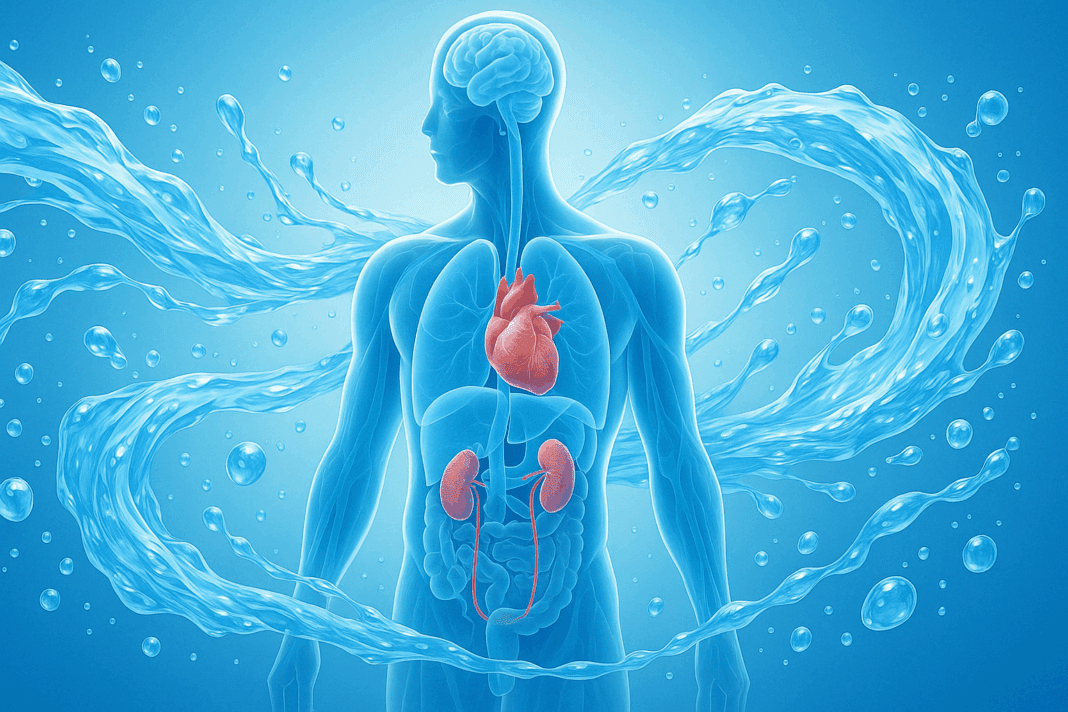Water is often overlooked in discussions about health, overshadowed by macronutrients like proteins, fats, and carbohydrates. Yet, it is the single most essential compound for sustaining life. Understanding the role of water in human physiology is not simply an academic exercise—it’s a foundation for appreciating how every cell, organ, and system in the body functions. While it might seem obvious that hydration matters, the subtleties of water function reveal just how vital it is to maintaining homeostasis, regulating temperature, supporting metabolism, and enabling the body’s complex communication networks. In truth, water is an important element in the body not just because of the volume it occupies, but because of what it enables—life itself. And when we begin to explore what part of the body does water help, the answer is, quite literally, every part.
A human being can survive far longer without food than without water. This alone signals the indispensable nature of hydration. A lack of awareness about not enough water in the diet can set the stage for subtle physiological imbalances that escalate into chronic problems over time. To truly understand why hydration must be prioritized, we must examine the biochemical, systemic, and clinical roles that water plays in the human body. This article will dive deeply into the molecular science behind hydration, explore the long-term implications of chronic underhydration, and highlight facts about maintaining fluids and minerals in the body that are not only practical but potentially lifesaving.
You may also like: Macronutrients vs Micronutrients: What the Simple Definition of Macronutrients Reveals About Your Diet and Health
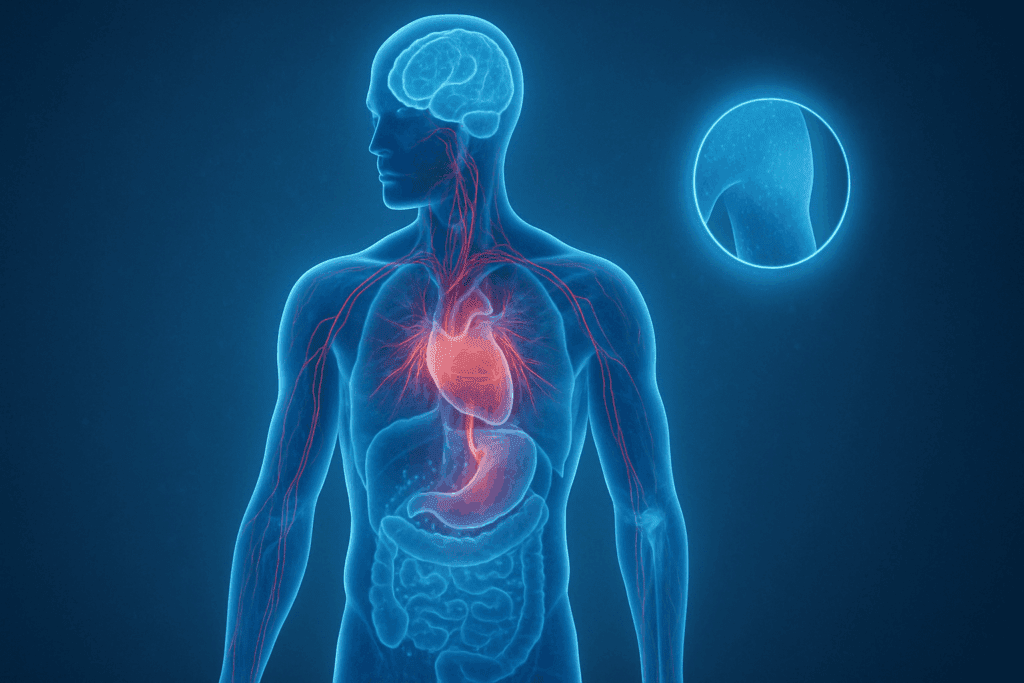
Understanding the Fundamental Functions of Water in the Body
Water’s function in the body extends far beyond simply quenching thirst. It is involved in nearly every critical physiological process. Comprising approximately 60% of the adult human body, water is not a passive backdrop to biological activity—it is the medium in which all biochemical reactions occur. From transporting nutrients and oxygen to cells to removing waste products through urine and sweat, water acts as the internal highway system that sustains life.
One of the lesser-known functions of water in the body is its role in maintaining the integrity of cell membranes. Cells require a stable internal environment to function properly, and water helps regulate intracellular and extracellular osmotic pressure, ensuring that cells neither shrivel up from dehydration nor burst from excess fluid intake. In this delicate balance, water serves as a buffer, maintaining electrolyte concentration and cellular homeostasis.
Another indispensable water function involves its thermal properties. Water has a high specific heat, meaning it can absorb and retain heat energy with minimal temperature change. This feature allows it to moderate the body’s temperature, preventing overheating and hypothermia. Sweat, for example, is a thermoregulatory mechanism in which water evaporates from the skin, carrying excess heat away. Without sufficient hydration, this mechanism fails, increasing the risk of heat exhaustion and heat stroke, especially in hot environments or during intense physical activity.
Moreover, water is an important component in the body for protecting delicate structures. The cerebrospinal fluid that cushions the brain and spinal cord is primarily water, providing both physical protection and nutrient delivery. Amniotic fluid, which surrounds a fetus in utero, is also predominantly water, underscoring its role in development. Water also lubricates joints through synovial fluid, allowing for smooth, pain-free movement. In the gastrointestinal tract, it helps dissolve nutrients, enabling absorption and facilitating the smooth passage of food.
As we begin to see, asking what part of the body does water help is a question that leads to an astonishingly comprehensive answer: all of them. From the skin to the kidneys, from the blood vessels to the brain, there is no tissue untouched by the necessity of hydration.
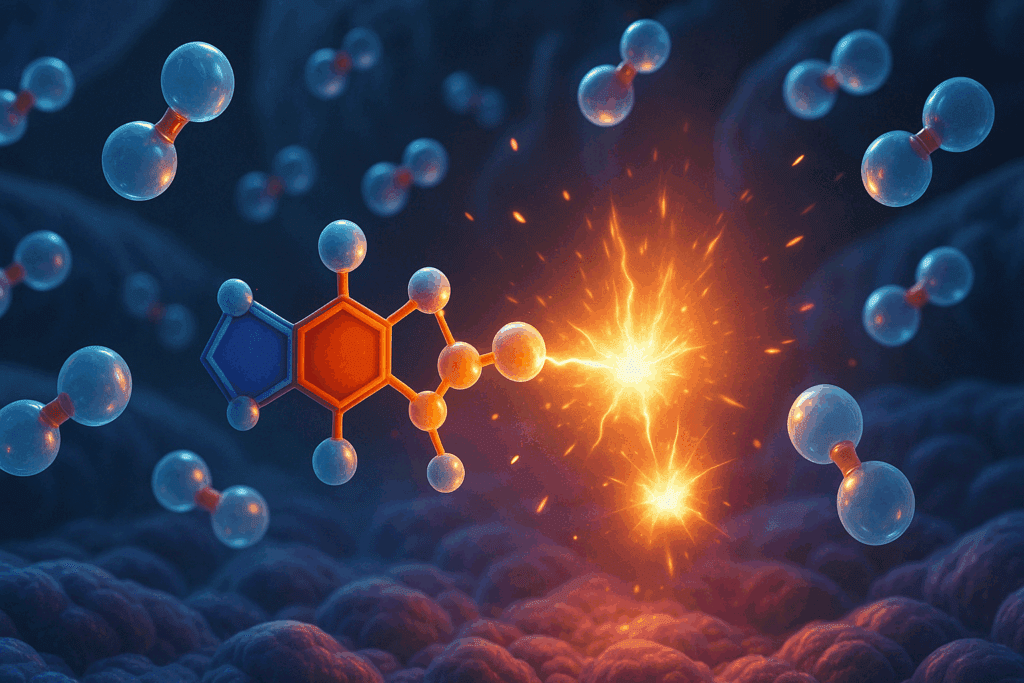
The Role of Water in Metabolism and Energy Production
While most people associate hydration with physical performance and digestion, few realize that water is intimately involved in metabolism at the cellular level. Metabolism, defined as the chemical processes that maintain life, relies on enzymes—and these enzymes require an aqueous environment to function effectively. Without water, metabolic reactions would either slow dramatically or stop altogether, compromising energy production.
Adenosine triphosphate (ATP), the molecule that fuels cellular energy, must be hydrolyzed—split by water—to release energy. This reaction, known as ATP hydrolysis, powers everything from muscle contraction to neural transmission. In essence, water is not only the medium in which metabolism occurs, but also an active participant in the reactions that drive biological energy.
Another crucial dimension of the role of water in human physiology involves the liver’s detoxification pathways. The liver metabolizes harmful substances, converting fat-soluble toxins into water-soluble forms that can be excreted via the kidneys or intestines. Without sufficient water, these detoxification pathways become congested, leading to the accumulation of metabolic waste. This can manifest subtly as fatigue, headaches, or skin issues—and more dramatically as impaired organ function in cases of extreme dehydration.
Water also facilitates the breakdown and transport of nutrients derived from food. Proteins, carbohydrates, and fats must be digested into smaller molecules to be absorbed, and water is a key agent in this digestive process. Saliva, gastric juices, bile, and pancreatic enzymes are all aqueous solutions. Inadequate hydration compromises the secretion and function of these fluids, impairing digestion and leading to nutrient deficiencies.
In a broader context, understanding facts about maintaining fluids and minerals in the body becomes essential for optimal metabolic health. Sodium, potassium, and magnesium are critical electrolytes that interact with water to regulate nerve impulses, muscle contractions, and heartbeat. A deficit in fluid intake disrupts this delicate electrolyte balance, often leading to muscle cramps, irregular heartbeat, and cognitive disturbances. This interaction highlights the inseparability of hydration and nutrient balance.
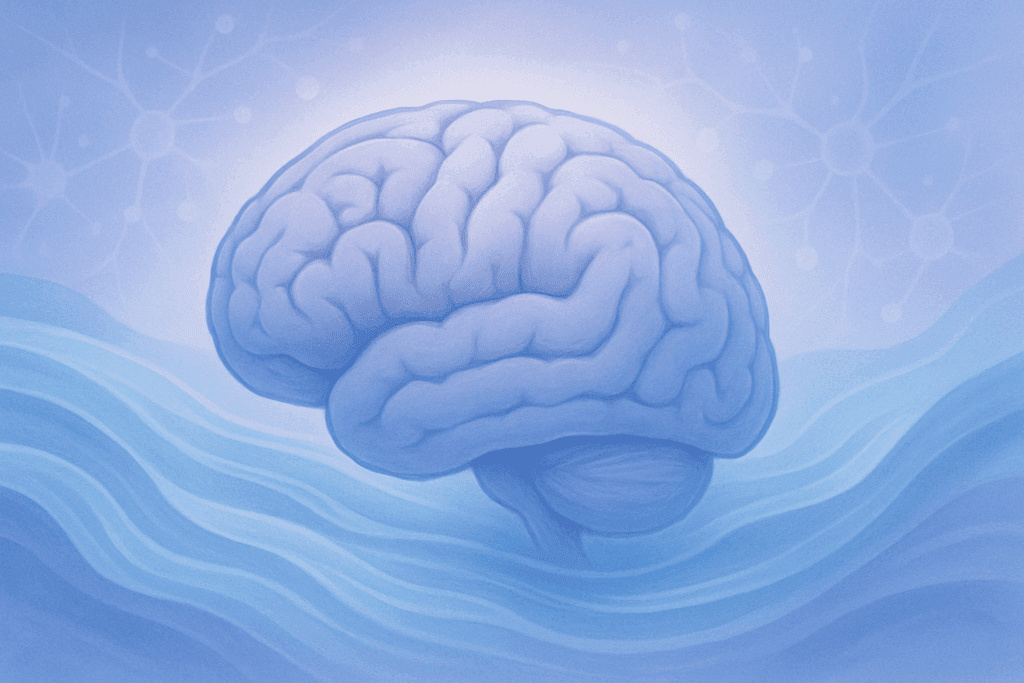
Brain Function, Mood, and Cognitive Health Depend on Hydration
The brain, composed of approximately 75% water, is exceptionally sensitive to changes in hydration status. Even mild dehydration—as little as 1–2% body weight loss—can impair cognitive performance. Research has shown that attention, short-term memory, and mood are all negatively affected when hydration drops below optimal levels. The reason for this is partly physiological and partly neurochemical.
Water helps maintain the volume and pressure of cerebrospinal fluid, which acts as a cushion for the brain and spinal cord. More critically, water supports the integrity of the blood-brain barrier, the specialized filtration system that regulates the passage of substances between the bloodstream and brain tissue. When hydration is compromised, this barrier can become more permeable, allowing toxins and inflammatory markers to enter the brain more easily.
Furthermore, neurotransmitters—the brain’s chemical messengers—rely on proper fluid and electrolyte balance for their synthesis and function. Serotonin, dopamine, and norepinephrine levels can all be influenced by hydration status. This relationship suggests a physiological explanation for the association between dehydration and symptoms like irritability, anxiety, and lack of focus.
In this way, water is an important substance in the body not only for its structural roles but for its capacity to modulate mental well-being. Chronic underhydration may contribute to low-grade inflammation, oxidative stress, and even neurodegenerative disease risk over time. While the conversation around mental health often emphasizes psychological, social, and pharmacological factors, hydration is an often-neglected piece of the puzzle—one that can have measurable effects on quality of life and cognitive function.
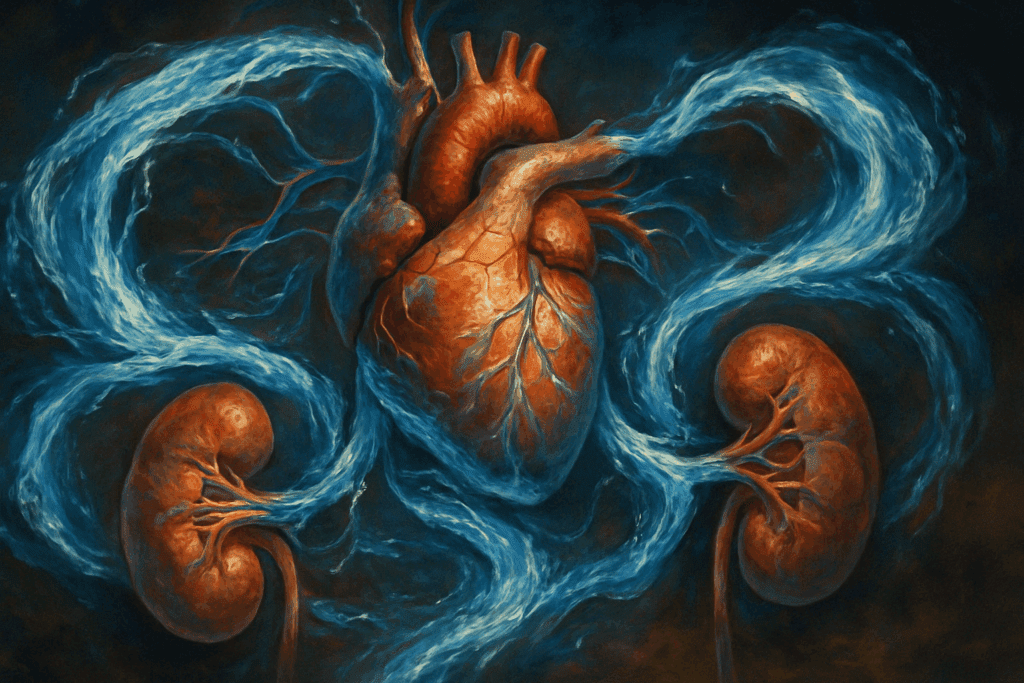
Circulatory and Renal Systems: Water’s Role in Filtration, Transport, and Detoxification
The circulatory system depends on water to perform its most vital tasks. Blood is about 90% water, and this fluid base enables red blood cells to transport oxygen to tissues and remove carbon dioxide as waste. Plasma, the liquid portion of blood, is also responsible for carrying hormones, nutrients, and immune cells throughout the body. Without adequate hydration, blood volume decreases, forcing the heart to work harder and potentially leading to elevated blood pressure or impaired circulation.
On the flip side, the kidneys—two bean-shaped organs that act as the body’s filtration system—are heavily reliant on water to flush waste products from the blood. Urea, creatinine, and excess minerals like sodium and potassium are removed through urine, which is composed mostly of water. When there’s not enough water in the diet, the kidneys are forced to concentrate urine, which can contribute to the formation of kidney stones and increase the risk of urinary tract infections.
This is where understanding facts about maintaining fluids and minerals in the body becomes critical for prevention. Hydration isn’t only about the quantity of water consumed, but also about how water interacts with electrolytes to maintain balance. Drinking excessive water without replenishing lost electrolytes—such as during prolonged exercise or illness—can lead to hyponatremia, a condition where sodium levels become dangerously low. Thus, balance—not just intake—is key.
Moreover, chronic dehydration places a silent burden on both the heart and kidneys. Over time, this can accelerate age-related decline in these organs. That’s why physicians often monitor fluid intake in older adults and patients with chronic conditions. Maintaining hydration is not simply about avoiding thirst—it’s about preserving the function of some of the body’s most essential systems.
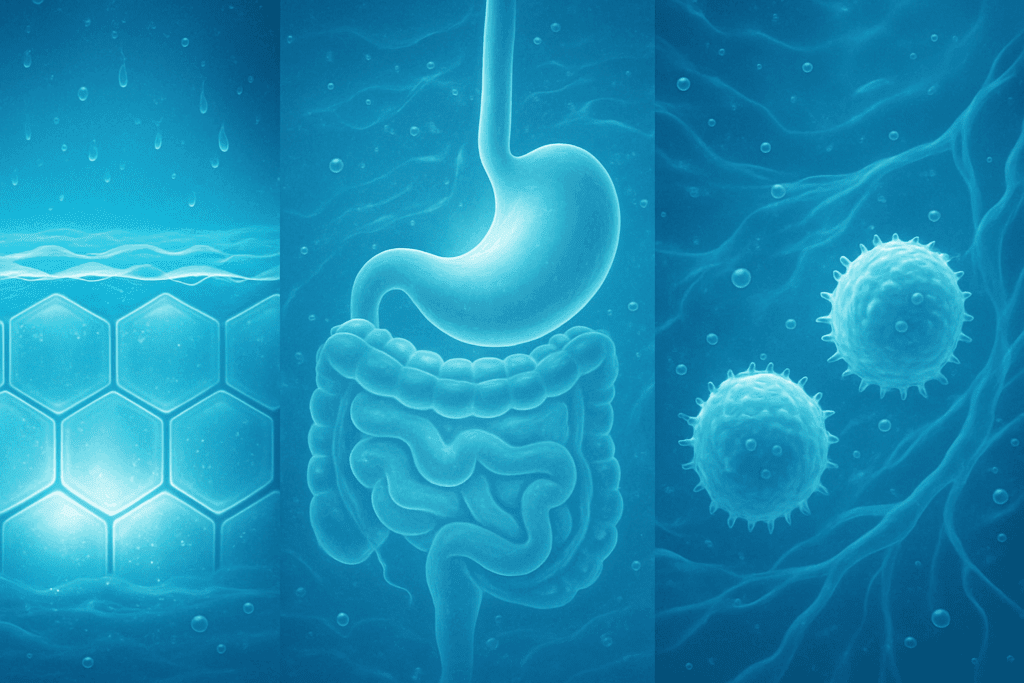
Skin, Digestion, and Immune Health: The Peripheral Impact of Water
The outermost organ of the body, the skin, is also deeply affected by hydration status. While cosmetic industries frequently tout products that “hydrate” skin externally, true skin hydration begins internally. Water influences skin elasticity, tone, and resilience. Inadequate hydration can lead to dryness, flaking, and premature wrinkling. More seriously, it can impair the skin’s barrier function, making it more susceptible to allergens and microbial invasion.
In the digestive tract, water facilitates the entire process from chewing to elimination. It helps form saliva and gastric juices, and it is essential for the breakdown and transport of nutrients. Insufficient water can slow digestion, leading to constipation, bloating, and nutrient malabsorption. Fiber, often recommended for digestive health, relies heavily on water to expand and function properly. Without it, high-fiber diets can exacerbate rather than relieve digestive discomfort.
Water’s contribution to immune health is multifaceted. On a systemic level, hydration supports the lymphatic system, which carries white blood cells and filters pathogens. It also helps maintain the mucosal barriers in the respiratory and gastrointestinal tracts—our first lines of defense against infection. When asking what part of the body does water help, the immune system may not be the first that comes to mind, yet its dependence on hydration is profound.
From skin clarity to gut motility to pathogen defense, the functions of water in the body extend outward in visible, tangible ways. This reinforces the notion that hydration is not simply about preventing illness, but about optimizing health across every domain of human physiology.
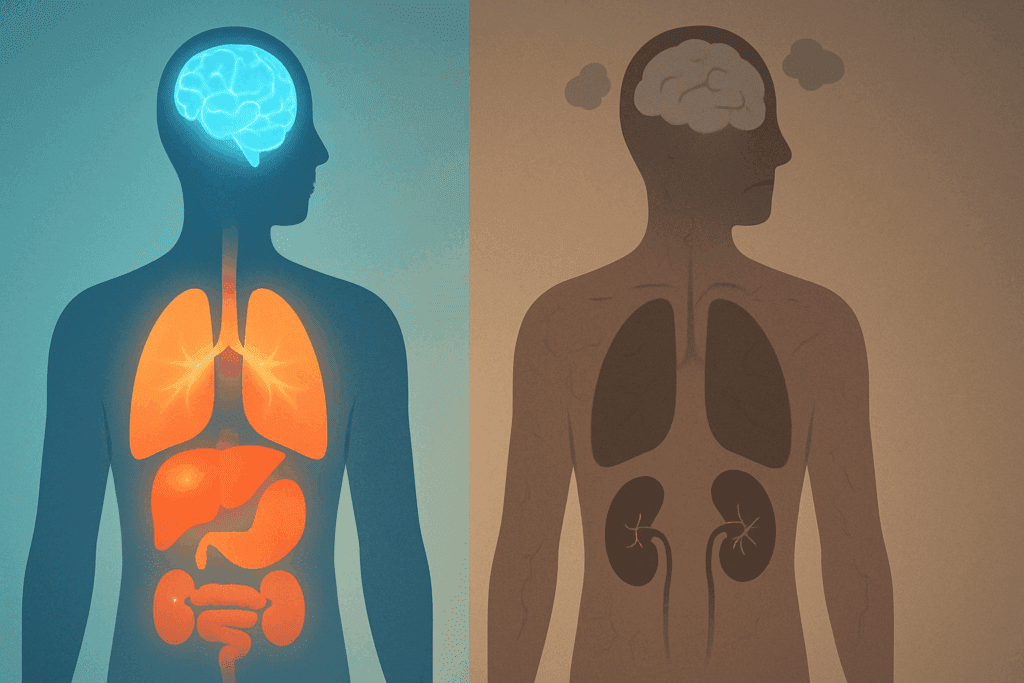
The Health Consequences of Chronic Dehydration
Many people experience a persistent state of underhydration without recognizing the long-term consequences. Chronic low-level dehydration has been associated with an increased risk of kidney disease, cardiovascular complications, and metabolic disorders. Over time, these risks accumulate, contributing to systemic inflammation, insulin resistance, and even cognitive decline.
Dehydration also exacerbates symptoms in existing conditions. Individuals with migraines often report that insufficient fluid intake triggers attacks. Those with irritable bowel syndrome may find their symptoms worsened by low water consumption. In older adults, dehydration can contribute to confusion, falls, and urinary tract infections, yet it often goes unnoticed because the sensation of thirst diminishes with age.
The takeaway is clear: not enough water in the diet doesn’t only lead to acute discomfort like fatigue or headaches—it has the potential to affect long-term health outcomes. Proper hydration is one of the most modifiable, low-cost, and impactful health behaviors available.
This is where revisiting facts about maintaining fluids and minerals in the body becomes not just informative, but actionable. Hydration strategies should consider individual needs, climate, activity level, and health status. Adding electrolytes after vigorous exercise or in hot climates, monitoring urine color as a hydration gauge, and eating water-rich foods such as fruits and vegetables are all practical steps that support fluid balance and overall well-being.
Frequently Asked Questions (FAQ): How the Body Uses Water and the Deeper Impacts of Hydration on Health
1. Can dehydration affect long-term mental health or emotional regulation?
Yes, emerging research suggests that chronic dehydration may influence not just momentary cognitive performance but also long-term emotional resilience. Water plays a pivotal role in supporting neurotransmitter balance, and persistent fluid imbalance can alter serotonin and dopamine levels, which may impact mood regulation. Over time, a deficiency in hydration may contribute to heightened stress sensitivity or reduced capacity for emotional recovery after distress. Understanding the role of water in human physiology includes recognizing how hydration affects brain chemistry and mental clarity, particularly in stress-prone individuals. When there is not enough water in the diet, the subtle accumulation of stress hormones and poor sleep quality may increase the risk for anxiety or depressive tendencies, even in otherwise healthy individuals.
2. How does water influence hormone regulation throughout the body?
Hydration status directly impacts hormone production and distribution, especially those tied to metabolism, adrenal function, and reproductive health. For instance, the antidiuretic hormone (ADH) is secreted in response to dehydration to help conserve water, while aldosterone works to balance sodium retention. Disruptions in hydration can overstimulate these pathways, causing imbalances in other endocrine systems. Furthermore, sex hormones like estrogen and testosterone are transported through the bloodstream, a medium largely composed of water. This connection illustrates that water is an important component in the body for more than just temperature control—it plays a nuanced role in maintaining hormonal balance across all life stages.
3. Are there hydration strategies that improve nutrient absorption?
Absolutely, and timing is crucial. Drinking a glass of water 30 minutes before meals prepares the digestive tract for optimal enzyme secretion and promotes better peristalsis, while drinking too much during meals may dilute stomach acid, hindering digestion. Certain minerals—such as magnesium and zinc—also require a hydrated intestinal environment to be efficiently absorbed. These are practical facts about maintaining fluids and minerals in the body that most people overlook. If the intestinal lining becomes dry due to not enough water in the diet, the ability to absorb fat-soluble vitamins like A, D, E, and K may decline, even when dietary intake is sufficient.
4. How does hydration affect the aging process, especially for older adults?
As we age, the body’s ability to sense thirst diminishes, and kidney function becomes less efficient in conserving water. This creates a situation where older adults are more prone to underhydration without realizing it, even when their fluid intake remains consistent. Chronic mild dehydration in older adults has been linked to higher rates of falls, confusion, and constipation. More importantly, since skin elasticity and collagen maintenance rely on adequate hydration, water function extends to preserving external signs of vitality as well. In this demographic, knowing what part of the body does water help becomes critical for preventing avoidable hospital visits and ensuring independence in daily living.
5. How does hydration interact with fasting or intermittent fasting protocols?
Hydration plays an amplified role during fasting periods because the body continues to excrete fluids through breathing, sweat, and urine despite the absence of food intake. Electrolyte loss can become more pronounced, particularly in longer fasts or ketogenic states, where the body excretes more sodium through urine. Incorporating mineral-rich fluids like coconut water or adding trace amounts of sea salt to water can support functions of water in the body during these fasting windows. These practices offer key insights into facts about maintaining fluids and minerals in the body that align with metabolic adaptation. Ignoring these strategies during fasting may lead to symptoms mistakenly attributed to hunger or low energy, when in fact, they’re rooted in fluid imbalance.
6. Can proper hydration influence immune response during illness or recovery?
Yes, and in several meaningful ways. Adequate hydration supports the production of lymph, the clear fluid that transports white blood cells and removes toxins from the body. During fever, sweating increases fluid loss, making replenishment even more essential. Maintaining hydration allows immune cells to circulate more freely and reach infection sites efficiently. These interactions underscore the role of water in human physiology in terms of cellular defense mechanisms, especially during periods of vulnerability. Moreover, when water function is compromised due to poor intake, the mucosal linings in the respiratory and gastrointestinal tracts become less effective, leaving the body more exposed to pathogens.
7. What unexpected symptoms might signal you’re chronically dehydrated?
Beyond the typical dry mouth or fatigue, some surprising signs include frequent muscle tightness, difficulty concentrating, low blood pressure upon standing, and even persistent sugar cravings. Dehydration can affect muscle electrolyte concentrations, leading to stiffness or twitching during physical activity. A foggy brain can also emerge due to reduced cerebral blood flow, demonstrating what part of the body does water help extends clearly into cognition. Interestingly, the hypothalamus sometimes misinterprets thirst signals as hunger, particularly for sweets, since sugar offers quick energy. This interplay reveals a deeper link between hydration and metabolic regulation, and why not enough water in the diet can have cascading effects on appetite and performance.
8. How do water needs change with exercise intensity and environment?
While physical activity universally increases fluid demands, intensity, duration, and climate all play crucial roles in determining how much. For example, exercising in humid environments limits sweat evaporation, increasing the risk of overheating and electrolyte depletion. Activities at higher altitudes also increase respiratory water loss. A tailored hydration plan that includes both water and electrolytes ensures proper functions of water in the body are sustained, particularly for endurance athletes or those in extreme climates. These considerations go beyond generic advice and reflect a more nuanced understanding of facts about maintaining fluids and minerals in the body as part of performance-based health strategies.
9. Is overhydration a real risk, and how can it be avoided?
Yes, overhydration—or hyponatremia—occurs when water intake far exceeds sodium levels, diluting the blood and impairing nerve and muscle function. This condition is more likely during endurance events when athletes drink large volumes of plain water without replenishing electrolytes. It’s a rare but serious risk, especially when hydration is viewed as a “more is better” strategy. Recognizing the role of water in human physiology includes acknowledging its balance with minerals like sodium and potassium. To avoid overhydration, individuals should aim for balanced intake that reflects their physical activity, sweat rate, and climate—not just arbitrary water goals.
10. How can someone intuitively assess their hydration status without medical tests?
There are several practical methods for gauging hydration that go beyond thirst. Monitoring urine color—pale straw indicating good hydration and darker shades signaling the need for fluids—is a simple and effective tool. Frequent headaches or irritability without a clear cause may also point to mild dehydration. Individuals can track their morning weight to detect sudden drops that might reflect fluid loss from sweating or illness. These tactics offer daily check-ins that support water function awareness without requiring labs or equipment. Ultimately, learning to recognize subtle physiological cues can help personalize hydration habits and reflect a deeper respect for water’s importance in the body across all dimensions of health.
A Final Word on Water: Why Every Drop Matters for Your Health
In the grand scheme of human health, few elements are as foundational—and as overlooked—as water. Understanding the role of water in human physiology reveals a complex, elegant system in which hydration supports every cell and function. From transporting nutrients to regulating body temperature, from supporting the brain to maintaining digestive and cardiovascular systems, water is an important player in the body in more ways than most people realize.
When evaluating what part of the body does water help, it becomes clear that the answer is holistic. There is no isolated system that operates without it. And when not enough water in the diet becomes a pattern, it sets off a cascade of dysfunctions—from subtle impairments in mood and energy to more serious risks to kidney and heart health. This makes water not just a necessity, but a therapeutic tool—one that is accessible, affordable, and profoundly effective.
As science continues to explore the intricate relationships between hydration and health, one fact remains indisputable: supporting the body’s water needs is one of the simplest yet most powerful actions we can take for lifelong wellness. Remembering the functions of water in the body and embracing hydration not just as a routine, but as a critical health behavior, empowers individuals to take charge of their well-being from the inside out.
Further Reading:
Why it’s important for you to drink water and stay hydrated
Water as an essential nutrient: the physiological basis of hydration


